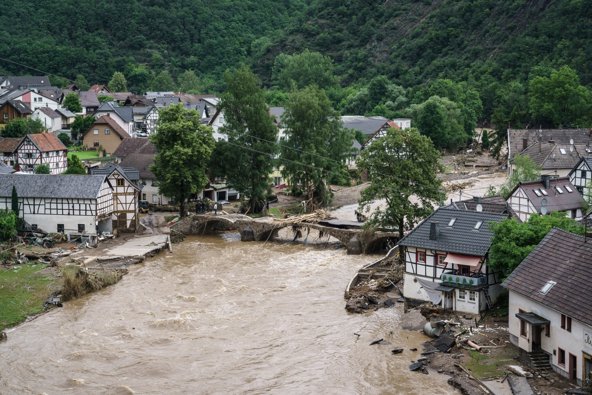
Germany Slashes Climate Protection but Costs Soar
Germany’s waning focus on climate protection collides with record natural-hazard costs and mounting pressure on economy and infrastructure.
Germany is facing a growing contradiction: while climate-related damages from extreme weather are mounting, the priority given to climate protection appears to be slipping. Experts say this signals a costly shift at a time when both the economy and society stand to lose.
Ambitious Targets, Slipping Momentum
Germany’s government and the European Union once hailed bold commitments to reduce greenhouse gas emissions and transform the economy. As climate-economist Professor Matthias Kalkuhl of the Potsdam Institute for Climate Impact Research puts it: “We adopted truly ambitious climate goals in Germany and the EU. When it comes to implementation and meeting those goals, it becomes very clear how difficult it is.”
Meanwhile, meteorological data show atmospheric concentrations of CO₂ reaching new record levels. Natural hazards are no longer rare acts of nature—they are increasingly part of the baseline.
Last year German insurers recorded billions of euros in payouts for extreme weather events. Jörg Asmussen, head of the German Insurance Association’s umbrella group, noted: “We paid alone last year €5.5 billion for damage from extreme weather events.” The indication: the costs are high and climbing.
Yet the political and institutional urgency for climate protection appears weakened. Kalkuhl identifies three main reasons behind this shift:
- Climate impacts are gradual, so the urgency is less visible.
- The cost burden of solutions is unevenly distributed, complicating fairness in policy.
- Global coordination is lacking—and recent geopolitical disruptions have made aligned action harder.
In other words: the bill is mounting, yet the will to act decisively is fading.
Natural Hazards Hitting the Economy
Climate damage in Germany is no abstract future risk—it is already hitting the economy. The European Environment Agency estimates that losses from extreme weather events amount to at least €80 billion since 2018. For example, building owners may have to spend €137 billion or more by 2035 to adapt homes and buildings for climate risks—heat waves, heavy rain and flooding.
Still, many new developments and urban expansions are being built as though climate change did not exist. “We are still building entire towns as if climate change didn’t matter,” says Asmussen, who calls for stricter land-use rules, flood-zone building prohibitions and green urban infrastructure.
The value of physical assets, the cost of insurance, and public financing needs are all being impacted. Government budgets may face growing pressure as nature-driven losses multiply—and the private sector may see rising risks embedded in its balance sheets.
Policy Tools Underused—and Why They Matter
Among the strongest tools for climate policy in Germany is the carbon-pricing mechanism, which sets a market signal for emission reduction. Kalkuhl describes the CO₂ price as “a powerful instrument” to incentivize both investment and behavior change. At the same time, experts call for revenue from emissions trading to be redirected toward supporting less-affluent citizens through the transition.
However, many policy debates focus instead on endless reporting, bureaucracy and compliance processes—raising questions about whether those efforts yield real reductions. “Thousands of data points are collected—how much does that actually reduce carbon emissions?” Kalkuhl observes.
This suggests the real issue is not only the presence of policies, but their effectiveness, speed and scale.
Why Policy Momentum is Slipping
Several converging factors explain why climate protection in Germany is losing steam:
- The climate problem is less visible and less immediate, compared to inflation, growth or energy security.
- Many of the solutions are costly and benefit different groups unevenly—making equitable policy harder.
- Germany’s government is also managing external pressures: war in Ukraine, energy-security shifts and inflation all divert public focus and resources.
- Meanwhile, recent assessments rate Germany’s climate policies as “falling short” of what is needed to stay on the 1.5 °C warming pathway.
The result: a policy architecture remains, but the urgency and strategic clarity are weakening.
What’s at Stake—and Why It Matters
Delaying or under-investing in climate resilience will increase the costs to society:
- More frequent and severe extreme weather means rising recovery and insurance costs.
- Germany’s heavy-industry base and manufacturing sector face competitiveness risks if decarbonization lags.
- Public finances will increasingly serve as the guarantor of last resort for natural-disaster recovery instead of investing in prevention.
- Failure to meet targets could erode international credibility, trade competitiveness, and innovation leadership.
The stakes extend beyond the environmental: they are economic, social and geopolitical.
Q: Is Germany still committed to climate neutrality by 2045?
Yes—the target remains in law. However current policies and levels of ambition are considered insufficient by several independent trackers.
Q: Will tougher regulations and higher carbon costs harm the economy?
Not necessarily, but success depends on fair distribution and supporting vulnerable groups. Carbon-pricing mechanisms paired with social measures can soften impacts while redirecting investment.
Q: Can Germany afford to delay action?
The short answer is: not safely. With mounting losses already observable and adaptation costs accelerating, delay will mean paying more later—both financially and socially.
Conclusion: Urgency in Decline as Risks Grow
Germany once stood as a leader in climate policy—setting audacious targets, shaping EU frameworks and driving clean-energy innovation. Yet signs now suggest that momentum is fading just as the risk environment grows harsher.
The gaps are not yet catastrophic—but they are widening. Unless policy execution is upgraded, funding and coordination enhanced, and ambition restored, Germany risks paying a steep—and rising—price for inactivity.
Time is not on Germany’s side anymore.
Sources: Clean Energy Wire Bundesregierung.info Federal Government of Germany Climate Action Tracker German Insurance Association European Environment Agency






